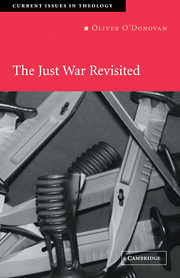2 - Counter-insurgency war
Published online by Cambridge University Press: 05 June 2012
Summary
Within the general class of civil – or, as it is usually called today, ‘internal’ – armed conflict there is a special problem with insurgency campaigns waged by non-governmental armies that, sometimes by choice but often by necessity, pursue a strategy of disseminating active armed units invisibly through the civil population. This puts the whole population in the position of a hostage shield, compelling a conventional military response to incur high levels of non-combatant damage – and adding insult to injury, no doubt, by exploiting the damage subsequently for propaganda purposes. The first moral question that arises from this practice is how counter-insurgency force can operate effectively while maintaining a respect for discrimination which insurgency does not share. But there is a second question, which I shall pursue in the reflections that follow. That is, can the conduct of counter-insurgency be conducted in such a way as to persuade insurgents to abide by the principle of discrimination?
The strategy of penetrating the civil population is already different from ‘terrorism’. The terrorist makes his point by slaughtering the innocent intentionally; the insurgent makes his by forcing his opponent to slaughter the innocent unintentionally. Insurgents may also be terrorists in fact; in the public mind, understandably enough, they are so almost by definition. Yet the difference is not to be dismissed lightly; every step towards restraint gains some ground for the civilising of armed conflict. To the extent that insurgents desist from immediate acts of terror, they display a higher level of respect for the demands of justice, even if their exploitation of the civil population as hostages fails to display respect at a very high level.
- Type
- Chapter
- Information
- The Just War Revisited , pp. 64 - 77Publisher: Cambridge University PressPrint publication year: 2003



